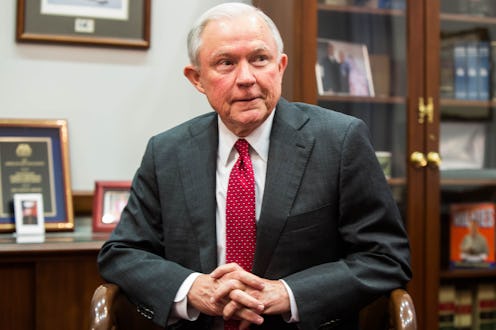News
It's What Jeff Sessions Won't Do That Scares Me

On Nov. 18, President-elect Donald Trump nominated current Republican Alabama Sen. Jeff Sessions to be his attorney general. A lot has been written about what Sessions could do if confirmed as attorney general, and the prospect is scary — he could formulate the legal strategy to kick immigrants, including kids, out of the country; he could overturn guidance keeping transgender students safe in schools; and he could help select a Supreme Court nominee that makes Justice Clarence Thomas look liberal, to name only a few.
The attorney general leads the Department of Justice and is the nation’s top law enforcement official. But the attorney general is a powerful office not only for what it can do, but for what it can choose not to do. The Department of Justice, which includes the storied Office of Civil Rights and Federal Bureau of Investigation, is charged with protecting our civil rights. But if confirmed, Sessions could drag his feet or even refuse to enforce laws he doesn’t believe in, with serious, lasting consequences.
As a legislative associate at the National Council of Jewish Women who works on civil rights, what keeps me up at night are the things Sessions can choose not to do. Here are just five ways he can impact our lives without ever lifting a finger.
By Not Respecting The Fundamental Right To Vote
Sessions does not believe that voter discrimination based on race is a problem. The Department of Justice is supposed to investigate claims of voter suppression, but if Sessions doesn’t believe those claims are real, then these investigations won’t happen. This year was the first presidential election in 50 years without the full protection of the Voting Rights Act, and efforts to deny people the ballot — particularly targeting people of color — will only strengthen if Sessions becomes attorney general.
By Not Protecting The Right To Worship
A law passed in 2000 with the ungainly name of the Religious Land Use and Institutionalized Persons Act, or RLUIPA for short, protects houses of worship from zoning discrimination. Essentially, it means that a city or town cannot use zoning laws to keep religious communities from building places to worship. The Department of Justice has pursued a number of cases under this law, but as attorney general, Sessions could choose not to support current and future investigations.
Sessions has ties to anti-Muslim groups, according to the Southern Poverty Law Center, and supported banning Muslim immigrants from entering the United States. If he’s confirmed, it’s not a stretch to think that it could get a lot harder to build a mosque.
By Not Continuing Improvements In Policing
Under the Obama Administration, the Department of Justice has undertaken numerous investigations about racial bias and brutality in law enforcement agencies across the United States. While there are no simple solutions for these complex problems, findings from these investigations are being used to improve policing in communities of color, including Baltimore and Ferguson, Missouri. As attorney general, Sessions could cancel current investigations and decline to begin new ones.
By Not Making Access To Reproductive Health Care Safe
Current Attorney General Loretta Lynch has prioritized enforcement of the Freedom of Access to Clinic Entrances Act (FACE), which protects safe access to reproductive health care facilities. In contrast, as a senator, Sessions voted multiple times against protecting abortion providers from violence, as well as voted to defund Planned Parenthood and advance his broader anti-choice agenda. As attorney general, he could decide not to enforce this important law, leaving these facilities — including their providers, staff, and patients — more vulnerable to harassment or violence.
By Not Defending Recent Gains In Civil Rights
Under the Obama Administration, the Department of Justice has worked for LGBTQ equality, religious freedom, and racial justice. One of the most dangerous things Sessions could do as attorney general is choose not to defend basic civil rights. During a 2015 hearing, Sen. Sessions said that "there is a perception, not altogether unjustified, that this department's civil rights division goes beyond fair and balanced treatment, but has an agenda" when speaking about the department he could soon lead.
Sometimes what a person chooses not to do can be the scariest thing of all.